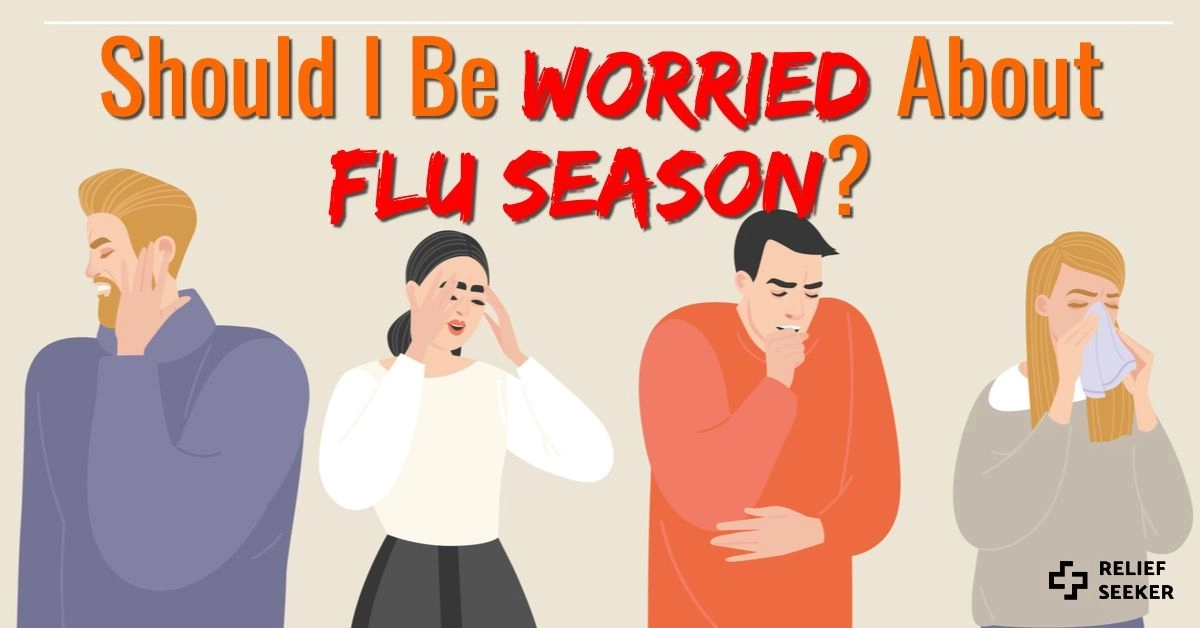Flu season is usually a cause for concern for most Americans. More than 1 billion people get the flu each year and this virus is the cause of death for more than 300,00 patients annually (and those numbers were recorded before the pandemic).
The flu virus can lead to lengthy medical visits and even hospitalizations.
Find out whether you should be worried about flu deaths, where to get a flu vaccine, and how to stay healthy between flu seasons.
The Truth About Flu Season
Influenza season is often a cause for public health concern. Seasonal influenza accounts for between 140,000 and 810,000 related hospitalizations each year. Most state department of health offices report on the number of flu cases that pass through the healthcare system each week.
Flu Virus Vs COVID
At the beginning of 2020, medical professionals were comparing COVID-19 to the common flu virus. Some officials claimed that COVID wasn’t as deadly as the flu, as others mentioned the shared symptoms of both viruses.
While we now know that the novel coronavirus is much more dangerous than the flu, it’s true that COVID symptoms are similar to flu symptoms. We also know that the outbreak of COVID may have actually slowed down the flu virus in 2020.
According to the Centers for Disease Control and Prevention (CDC), “The percentage of U.S. respiratory specimens submitted for influenza testing that tested positive decreased from >20% to 2.3% and has remained at historically low interseasonal levels (0.2% versus 1–2%).”
Americans were implementing measures to protect themselves against COVID but also ended up protecting themselves from other airborne viruses, such as the flu. All the hand-washing, mask-wearing, and social distancing protected us from both viruses.
Many people are also seeking medical attention for respiratory illnesses much faster than in previous years (because they’re worried their symptoms indicate COVID). This means they’re getting the proper treatment right away — not when their symptoms have progressed. A higher number of people are also getting tested for the flu, and influenza deaths are down.
Yet, that doesn’t mean that you can’t get the flu virus at all.
While the flu has many similarities to the novel coronavirus, the two viruses aren’t the same in terms of contraction, symptoms, treatment, and fatality.
The health care system has stated that it’s very difficult to contract COVID from touching surfaces with virus molecules. Yet, you can still contract the flu by touching a table, doorknob, or another surface contaminated with virus bacteria.
This means it’s even more important to wash your hands for at least 20 seconds in hot water after touching surfaces in public places. You may want to use hand sanitizer when you’re on-the-go.
How to Prevent the Flu
The flu often feels like it’s everywhere in the winter. We can’t turn a corner without running into someone coughing or sneezing or touching a doorknob that has been touched by hundreds of others before us.
Yet, we can take some preventative measures when it comes to the flu. Until COVID is eradicated (or at least under control), we’ll probably all be wearing masks, manically washing our hands, and maintaining social distancing.
But what happens after COVID? Will we go back to handshaking and hugging? Will we go to work when we’re sick? Or, will we continue to wear masks (especially when we’re sick)?
There are some basic ways you can prevent contracting the flu virus — both now and post-COVID.
Make Health a Priority
If you’re someone that seems to be more susceptible to the flu virus, you may want to simply make your health a priority.
It’s easy to let some health concerns fall to the wayside, but doing so may increase your risk of contracting certain viruses, including the flu.
When you don’t eat healthy foods, stay hydrated, and exercise regularly, your immune system can suffer. You may end up at a higher risk for contracting some illnesses.
To avoid this, you may want to get tested for nutrient deficiencies and take supplements if you need to boost your vitamin intake. You may also want to limit alcohol intake and stop smoking; when your liver and kidneys are spending all their time removing toxins from your body, it can lower your immune functions. Smoking can make your respiratory system work harder, making you more susceptible to respiratory illnesses.
Get a Flu Shot
One easy way to avoid the flu is to get a flu vaccination. You can get such a vaccination at most pharmacies, some grocery stores, and all urgent care centers. Your primary care physician may be able to administer a flu shot, too.
You can also get a flu shot at urgent care centers and through at-home urgent care.
Flu shots can reduce your risk of contracting the strain of the flu virus that is predominant in the current year. You need to get a flu shot at least once a year (or as recommended by your health care provider).
Some people are not eligible for the flu shot, including anyone allergic to eggs. Some people with egg allergies may be able to get the flu shot anyway. It’s always best to talk to your doctor about any possible allergic reactions. If you have allergies (such as egg allergies) but are eligible for the flu shot, get the shot at your doctor’s office to ensure proper treatment for any adverse reactions.
Avoid Sick People
Another (seemingly) easy way to avoid the flu is to simply avoid sick people. If someone in your office is sick, ask that they wear a mask (or wear a mask yourself).
While the COVID virus is still rampant, many employers and businesses are asking anyone with flu symptoms to stay home.
If you can’t avoid someone that is sick (such as a child or partner), you may simply want to keep surfaces as clean as possible and avoid close contact as much as possible. It’s also important to wash your hands regularly when you’re exposed to sick people.
Practice Good Hygiene
Practicing good hygiene is one of the best ways to protect yourself from any germs — flu, COVID, or other viruses.
It’s important to wash your hands after contact with others or after touching surfaces. Wash with antibacterial soap under hot water for at least 20 seconds.
Don’t touch your face, hair, eyes, or mouth, as this can accelerate the spread of germs. Cover your mouth when you cough or sneeze, and wash your hands after they have been near your mouth, nose, and face.
How to Treat the Flu
If you’ve contracted the flu, don’t worry. You’re one of the 49 million people that get the virus each year. It’s important to monitor your symptoms (especially if you have preexisting medical conditions) to ensure your symptoms don’t progress or become more serious. The CDC recommends the following options to treat the flu.
Stay Home
If you’re sick, you should stay home. You don’t want to infect others with a virus, and you don’t want to increase your chances of getting even sicker by exposing yourself to other infectious diseases.
Try to stay home for at least as long as symptoms persist (possibly longer if you haven’t been tested for COVID).
Get Plenty of Rest
Our bodies need lots of rest to recuperate. We virtually cannot heal without enough sleep.
When you have the seasonal flu, your body is working double-time to rid itself of infection as well as run its basic functions. This means you’ll probably be sleepier than usual. Getting plenty of rest will ensure your body has the resources to heal itself, and you may find yourself feeling better after a good night’s sleep or even after a long nap.
Take Over the Counter Medication
If you’re suffering from flu symptoms (such as aches and pains, sore throat, stuffy nose, and coughing), taking over-the-counter (OTC) medication should help ease these symptoms. Always check with your doctor before taking OTC medications.
Stay Hydrated
It’s easy to forget to drink water and force liquids when you’re suffering from congestion and a sore throat. Yet it’s important to stay hydrated when you have the flu, as your body can flush toxins easier when it’s properly hydrated.
Call an Urgent Care Provider
If your symptoms are worsening or haven’t gotten better after 48 hours, you may want to contact an urgent care provider, such as a walk-in clinic, an online urgent care center, or at-home urgent care (such as Ready).
These medical providers can offer prescription treatments and professional medical advice.
When to Seek Professional Treatment
If you’re worried about your flu symptoms progressing, you may want to seek treatment. If you aren’t experiencing emergency symptoms (shortness of breath, pain, and frequent dizzy spells), you may want to call an online urgent care provider.
These providers can help you understand your symptoms and help you determine when it’s time to go to the hospital to receive emergency treatment.


